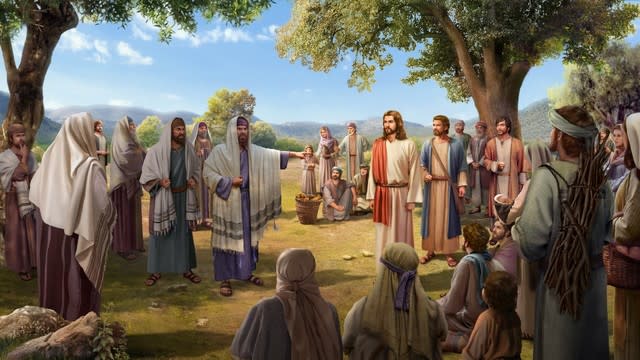By Hanxiao

Many Christians believe that the Lord Jesus’ disposition is mercy and lovingkindness. He never unleashes His wrath to people, but instead He treats people like a loving mother to her baby, carrying no majesty or wrath. Especially to those who believe in Him and follow Him, whatever sins they commit, He will not curse them, but forgive them. Does this conception of man accord with the truth? Then, let’s fellowship about the truth concerning God’s disposition!
We believe that the Lord Jesus’ disposition is only lovingkindness and mercy, without majesty or wrath. Is it true? If it were so, then why would the Lord Jesus rebuke the Pharisees when He did His work? He said: “But woe to you, scribes and Pharisees, hypocrites! for you shut up the kingdom of heaven against men: for you neither go in yourselves, neither suffer you them that are entering to go in” (Matthew 23:13). “You serpents, you generation of vipers, how can you escape the damnation of hell?” (Matthew 23:33). The Lord Jesus condemned the Pharisees as the generation of vipers and Satan, and pronounced seven woes against them. And Judas, who betrayed the Lord Jesus as one of His disciples, was punished by Him because of offending His disposition. He burst asunder in the middle, and all his bowels gushed out. Similarly, Ananias and Sapphira his wife, who lied to the Holy Spirit and didn’t acknowledge that they kept back part of the price, were punished to death by God immediately. From these facts, we know that the disposition of the Lord Jesus encompasses not only lovingkindness and mercy, but also majesty and wrath, the combination of which is the very manifestation of God’s inherent righteous disposition. The reason why the Lord Jesus expressed the disposition of mercy and lovingkindness in the Age of Grace was because people in the Age of Law, who lived in sin and under the condemnation of the law, needed mercy and salvation of God badly. Hence, God was incarnated for the first time to do the redemptive work under the name of Jesus and bear the sins of man through His crucifixion. As long as man repented and confessed sins to the Lord Jesus, he would be forgiven of his sins, through which he would be qualified to pray to the Lord and enjoy the abundant grace from Him. It was just because God expressed the disposition of mercy and lovingkindness in the Age of Grace that man could be saved through the grace. Obviously, our conception that God’s disposition is only lovingkindness and mercy but not majesty or wrath, is purely man’s conception and imagination. It is the delimitation of God’s disposition and is not in accord with the truth at all.
Actually, God’s mercy and wrath for mankind are principled. They are not baseless, but are determined by man’s different attitudes toward God and by his deeds. Just as this passage of words I saw in a book, “The mercy and tolerance of God do indeed exist, but God’s holiness and righteousness when He unleashes His wrath also show man the side of God that brooks no offense. When man is fully capable of obeying the commands of God and acts in accordance to God’s requirements, God is abundant in His mercy toward man; when man has been filled with corruption, hatred and enmity for Him, God is profoundly angry…. He is tolerant and merciful toward things that are kind, and beautiful, and good; toward things that are evil, and sinful, and wicked, He is profoundly wrathful, such that He is unceasing in His wrath. These are the two principal and most prominent aspects of God’s disposition, and, moreover, they have been revealed by God from beginning to end: abundant mercy and profound wrath” (“God’s Work, God’s Disposition, and God Himself II”).
God’s inherent disposition possesses not only lovingkindness and mercy but also profound wrath. The tolerance and mercy of God toward man do indeed exist, but His majesty and wrath brook no offense. God is loving, merciful and tolerant toward those who are capable of obeying Him and following His way; while toward those who resist Him, fail to follow His way and are disobedient to His work, God is majesty and anger, and even condemnation and curse. For example, when the Lord Jesus did His work, to those who were able to obey the Lord’s words and work, follow His way, and confess their sins and repent to Him, like tax collector, Peter and Samaritan woman, the Lord was tolerant, forgiving, merciful and loving. Moreover, He blessed and guided them frequently. However, the Lord cursed the Pharisees who persecuted, condemned and created rumors on Him and punished Judas who betrayed Him. What’s more, from different outcomes of people in Nineveh and in Sodom in the Age of Law, we can see that God is abundant in His mercy toward those who listen to His words, obey Him, and repent to Him; He is profoundly angry toward those who stubbornly oppose Him. In fact, before God decided to destroy Sodom and Nineveh, He gave them the same opportunity to repent. Consequently, people of Sodom were destroyed by God, for their stubborn resistance toward God offended His disposition; people in Nineveh gained God’s mercy for their repentance before God. From these facts of God’s work, we see that God’s disposition is indeed righteous, is real and vivid, but not unchangeable. God’s attitudes toward man vary with man’s attitudes toward Him and His work. So, God’s disposition is abundant mercy and profound wrath. If we define God’s disposition as mercy and lovingkindness, we won’t gain the knowledge of God, and will easily offend His disposition and be cursed and punished by Him because of lacking the knowledge of His disposition. Therefore, we should not delimit God in believing in God. And it is of vital importance to know His disposition.
Source: Walk in the Light
Recommended: It Is Very Important to Understand God’s Disposition
During frequent disasters, how should we truly repent so that we may be raptured into the heavenly kingdom? Click here to have a discussion with us online.




















※コメント投稿者のブログIDはブログ作成者のみに通知されます